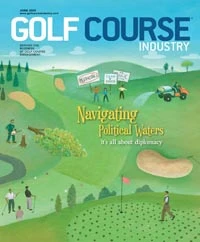Water. Agua. H2O. Who isn’t talking or writing about it these days? Words such as drought, restriction, conservation and rights are tossed around frequently when the topic of water is discussed. Here in the Great Lakes region, legislators are working to prevent water diversion to thirsty states in the West. Even Hollywood – in the form of ecocrazed Ed Begley Jr. and others – has spoken up. There’s no doubt about it: Water is a precious resource, and its use is being scrutinized.
But there are too many people among the general public, as well as state regulators, who believe golf course superintendents are part of the water-use problem. Many of the folks who claim golf courses consistently misuse and waste water are emotional and passionate about the environment. They’re also often misinformed or uneducated about the water issue as it relates to the golf industry. Still, they have the ears of politicians, who love to take hold of an emotional issue and run with it for political gain.
In Georgia, drought conditions have been severe – 61 counties skipped level three restrictions and went directly to level four, which bans all outdoor watering. The golf industry has been targeted unfairly.
“Golf, which is a $3.5-billion business in Georgia, has been mandated to save 97 percent of water when other businesses were asked to save only 10 percent,” says Mike Crawford, CGCS, at TPC Sugarloaf in Duluth. “The GCSAA is working with the state to come up with a plan that works for all.”
Water use is an enormous issue in many areas of the country that has yet to be resolved. And the severity of the problem is expected to worsen in the future.
So, just like combating activists when it comes to pesticide and fertilizer use, the industry, as a whole, needs to unite to help alter the false perception that golf courses waste water.
Superintendents are good at growing grass but not as good at fighting a bad public relations image. They need help. Aquatrols, the wetting agent manufacturer, is one example of a company helping those in Georgia by mounting a PR campaign to show the general public that superintendents are good stewards of the environment and don’t waste water. Rain Bird and Toro are two other companies that come to mind immediately. The GCSAA is doing its part, too. It:
- Meets with legislators and regulators on the national and state levels.
- Provides resources to chapters to help them work with governing bodies at the state and local levels.
- Communicates the expertise of its members to the U.S. Environmental Protection Agency.
- Provides action alerts to members so they can contact and educate members of Congress.
The GCSAA also is targeting employers, avid golfers and nongolfer audiences through publications, symposiums and conferences, as well as through the Golf Channel and other partnerships, such as those with Toro, Rain Bird, ESPN and Fox Sports.
The golf industry needs to continue to increase these efforts in the long term to educate those who have a distorted and misinformed view about water use on golf courses. Currently, it seems the industry’s efforts aren’t that effective because they’re not unified. It needs to flex its collective muscle. The GCSAA can’t do it alone. Superintendents, general managers, owners, the various industry associations and even suppliers not directly related to irrigation need to band together – mentally, strategically and financially – to be more effective in executing a much-needed wave of public relations to help set the record straight. It’s crucial to the industry’s future. GCI

Explore the June 2008 Issue
Check out more from this issue and find your next story to read.
Latest from Golf Course Industry
- From the publisher’s pen: Conscientious of a bigger role
- Bernhard and Company partners with Laguna Golf Phuket
- Terre Blanche showcases environmental stewardship
- VIDEO: Introducing our December issue
- Bernhard and Company introduces Soil Scout
- Nu-Pipe donates to GCSAA Foundation’s Centennial Campaign
- GCSAA enhances golf course BMP tool
- Melrose leadership programs sending 18 to 2026 GCSAA Conference and Trade Show





